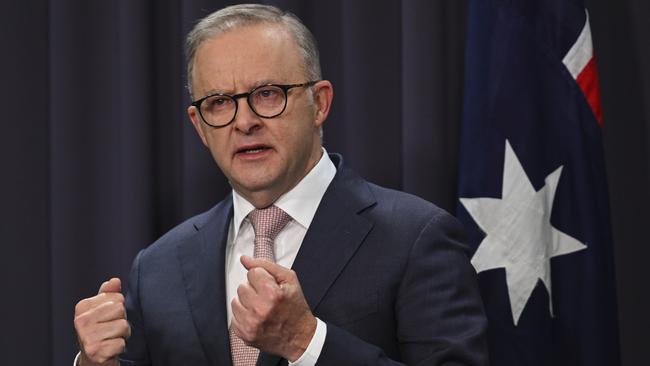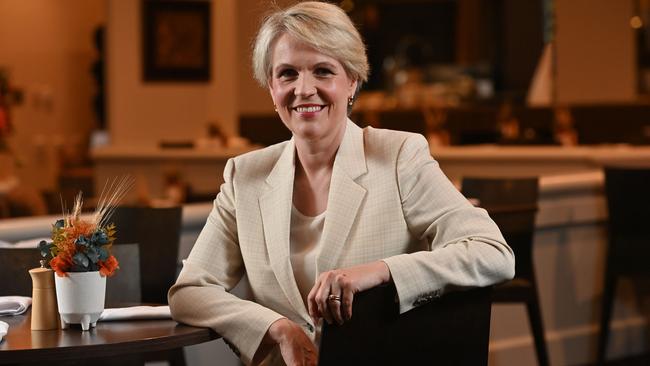
Albanese is right, there is a role for government, but it is more to clear the investment hurdles than handouts, and in attaching the jingoistic tag he simply invited criticism from Gary Banks et al who have played the tune since their days with the late Bill Carmichael at the IAC in the 1980s.
Each year 58 million petajoules of solar energy fall on Australia, but in 2021 the country converted just 100 petajoules of solar to electricity.
There is surplus land and wind which with the help of global technology utility batteries will in the view of David Leitch at Renew Economy take market share from hydro as capacity increases from 1.3 gigawatts to 7 gigawatts in the next three years providing 25 per cent of peak power needs.
Best of all with just three main providers of power today, batteries are opening the field to newcomers and local area power, providing new competition.
Graeme Samuel, who led the Environment Protection and Biodiversity Conservation Act review, argues the best policy support is a HECS-like loan which companies must pay back when they become profitable.

Albanese has embraced loans as the best support because the money is paid back.
Consistent policy administered by an independent Environment Protection Agency installed this week by Tanya Plibersek will also have the power to keep the states in line.
Samuel’s push for a complete revamp of the conservation law will also help, which is why he has confidence after two years of inaction by the Morrison government and against the self-serving demands of both the mining industry and conservationists.
It remains to be seen whether Environment Minister Plibersek fulfils his faith.
Samuel also pushes the resurrection of the Australian Industry Development Bank first established by John Gorton in 1970, as in independent government-backed financier.
But shortage of capital is not the issue, it is a clear government framework.
Politicians tend to focus on easy wins like electric vehicles and the thematic of just electrify everything.
Ampol is in the centre of this debate, but just circa 35 per cent of its fuel goes into passenger vehicles, the rest goes to heavy industry including aviation which is classified as hard to decarbonise.
Industrial emissions in hard-to-abate sectors like aviation is the key battle ground especially at a time of high energy prices crippling users.
Ampol has the capacity to be a player at its Lytton refinery in Queensland which is already underwritten by the federal government thanks to former minister Angus Taylor’s largesse.
Ampol’s $355m convenience network is positioned of to enjoy the switch to electric vehicles as EV shoppers have more time to fill.

As noted in past columns Australia has abundant natural comparative advantages to create a sustainable aviation fuel industry but while BP, Cargill, Ampol, Nufarm, Shell and others are lined up to enter the game locally, the first step is to beat the cost challenge.
The US is pouring billions of subsidies to support its Californian SAF base and mandates result in higher prices to the advantage of incumbents like Qantas.
Again technology may help, with platforms providing the chance of offshore support to grow a domestic base with Shell’s Avelia and the Macquarie-backed Sky NRG among the players.
Mandating defence as a consumer would also help create local demand to support supply from sugar, canola and the new carinata biofuel.
There are no shortage of well resourced companies looking for government support which raises some red flags but it all starts with clear policy directions, less roadblocks and whole-of-government solutions putting the environment on top of each policy decision rather than ad hoc subsidies.
Carbon talks
ANU’s Andrew Macintosh is never far from the offset debate but not from the ideological stance of Greenpeace et al who see carbon offsets as a way of legitimising fossil fuels.
Macintosh used to be a carbon regulator and has recently done some work for Ken Henry’s Australian Climate and Biodiversity Foundation, pushing for new offset methods for avoided clearance of forests.
His beef is a claimed lack of regulation of carbon credits which the industry and Professor Ian Chubb flatly reject, noting if no carbon is measured than no credits are issued.
Cyber crime wave
The way Illumio boss Andrew Rubin sees it cyber crime is motivated for financial and political reasons which makes the present heightened geopolitical risks – at a time when two billion people are due to vote this year – a particularly dangerous time.
Then consider if you are a company defending yourself you have to get it right 100 per cent of the time but if you are the attacker then it’s just 1 per cent and you are in.
Illumio is a software company selling protection under the zero trust banner. That means never trust, always verify, treat every user and device as a potential threat, continuous verification and operate with the least privilege access.
Rubin, who co-founded the company with PJ Kirner in 2013, operates from the belief that most companies have too many parts talking to each other which means a breach in one area quickly spreads.
Trouble is management books tell you it is best if everyone is on the same page which is where cybersecurity conflicts with good management.
Less friction can mean less security.
The analogy is a submarine which is split into different cabins so a leak in one won’t bring the whole ship down.
Rubin is in Australia on a brief Asian tour seeing customers.
Illumio has 12 staff in Australia and while some may say Australian industry is too concentrated from where Rubin suits that means efficient channels to market.
The company has raised $US582m which puts its private market valuation at $US2.8b.
Rubin won’t comment on earnings or revenues but has said last calendar year was a record with $US100m in bookings in the fourth quarter.
The Forrester Total Economic Impact (TEI) study 2023 showed 111 per cent return on investment realised with Illumio zero trust segmentation.
Local partners include Accenture, Sekuro, Tesserent, CyberCX and IBM and regional customers include Lion, Cathay Pacific and running shoe maker Brooks.
As someone who sells software to help protect companies from cyber attacks Rubin isn’t about to talk down the risks, but he notes that while some argue most attacks have been more of a nuisance than a catastrophe that will change.
He tells directors to adopt the mindset they will be attacked, it’s a key business risk, meet often with chief security officers and technology chiefs and tell them not to worry about mistakes, speed is the essence.




Prime Minister Albanese’s ill-fated “made in Australia” policy is a dumb tag which threatens to swamp the fact the country is blessed with extraordinary natural comparative advantages to ride the renewable wave.